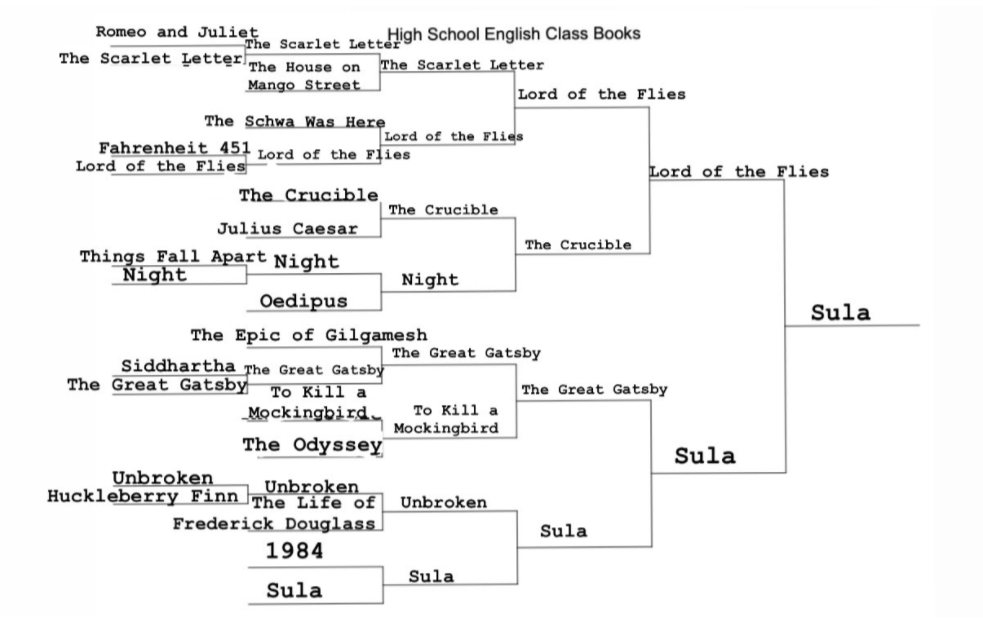For a person in search of thought-provoking, multilayered reading material, the richest mining ground may be as inconspicuous as a high school English class. There, a bookworm can find a variety of texts to quench their thirst, both ancient and modern, contemporary and mythological, poetic and matter-of-fact. However, the dissimilitude of the books yields the inevitable fact that some outshine, while others disappoint. From The Epic of Gilgamesh to 1984, here are the best and worst books of my high school English career.
The Best of Times…
- Sula
A beautifully structured novel by Toni Morrison, Sula is an intricate quilt made from the colors and patterns of Black culture. Its careful weave of emotion, apathy, friendship, betrayal, life, and death blurs every line and reflects life’s duality and complexity. Morrison rejects binary thinking, instead painting each character and event slowly and building multiple layers one at a time. Sula is a perfect balance between entertainingly descriptive drama and challengingly abstract philosophy,
- Lord of the Flies
Although it’s been 3 years since I read William Golding’s Lord of the Flies, its gripping storyline and frightening overarching questions are memorable to say the least. The novel follows a group of preteen-aged boys, stranded on a deserted island with no adults. The reader follows the boys as they form tribes, elect leaders, struggle to survive, encounter horrifying symbols of fear, forget their own identities, and lose their innocence. Lord of the Flies, enchantingly haunting, dares the reader to comprehend uncomfortable questions: What is fear and how powerful is it? What does it mean to be civilized? In its most raw and unfiltered form, what is human nature? What is a human being capable of when beyond the reaches of law?
- The Crucible
Set in the small town of Salem, Massachusetts circa 1642, Arthur Miller’s The Crucible is a partially historically-accurate play that describes the events of the Salem witch trials. Filled with hidden skeletons in closets, betrayals and sacrifices, theatricality, superficiality, fantastical accusations, and personal guilt, The Crucible explores mankind’s selfish nature as well as the concepts of othering and scapegoats. Spouses, neighbors, and friends accuse each other of witchcraft in order to protect themselves, and certain characters who take leadership of the chaos become immune to its consequences. The small town Salem becomes an eerie metaphor that forces the reader to ponder othering, society, and mankind’s hypocrisy as a whole.
…The Worst of Times
19. The Adventures of Huckleberry Finn
Despite being one of the most well-known pieces of classic literature, Mark Twain’s Huckleberry FInn was, quite frankly, underwhelming. The relatively one-dimensional characters, often incomprehensible dialogue, and unnoteworthy writing style placed it among my least favorite. It also lacked some of the deeper introspective qualities that I appreciated in other books. The book is a classic for a reason, and certainly has its literary and cultural significance. However, I can say with confidence that it was not among my most enjoyed reads.
20. The Schwa Was Here
Neal Schusterman’s protagonist in the novel The Schwa was Here suffers from the curse of insignificance. He fades into the background of everyone else’s life, so much so that many of his classmates don’t realize he is there at all. Unfortunately, the novel displays similar qualities, and I found it to be unremarkable in comparison to the other books. The novel felt elementary and gave the sense of a middle schooler’s leisure read rather than the subject of a high school English class. In all fairness, I read the book at the beginning of my freshman year, which provides some excuse for the novel’s simplicity.
21. Things Fall Apart
Getting through Chinua Achebe’s Things Fall Apart was more an exercise in self-discipline than literary analysis. The book was monotonous, and its simple writing style and half-baked character development felt more crass and unrefined than raw and whole. Its topic– life in southeastern Nigeria before and after colonization– certainly held much potential. However, its anticlimactic delivery rendered the book mundane.
English teachers have standards when choosing a book to teach a high school class, and it is true that each book holds value and significance in some way or another. However, some of them proved to be moving and unforgettable, while others became a distant memory or even gained notoriety amongst students. Regardless of your personal preferences, the variance of material in high school English classes means there is something for everyone.

Hi! My name is Jannah and I am a senior editor and multimedia editor for The Mycenaean. I am also a math tutor, engineering intern, and a tennis player.

Leave a Reply